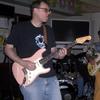WhorehayRFB

Joined: Jun 12, 2008
Posts: 3331
Huntington Beach, CA





|

Posted on Apr 25 2012 06:19 PM
|
remora1

Joined: Jan 04, 2008
Posts: 1278
San Pedro, CA




|

Posted on Apr 25 2012 06:42 PM
I heard it was pronounced "Taysco" but when Scott Thurston of Tom Petty's band came by to pick up one I sold he said "TIE-sco" so I 'd like to know too  . .
— Bill S._______
Last edited: Apr 25, 2012 18:43:29
|
squirt50

Joined: Apr 27, 2008
Posts: 82
Chicago.
|

Posted on Apr 25 2012 06:52 PM
I always thought it was tess-co. But what do I know.
— I came. I saw. I left.
|
drumuitar

Joined: Feb 28, 2006
Posts: 813
Boise, ID

|

Posted on Apr 25 2012 06:58 PM
|
LHR

Joined: Aug 23, 2006
Posts: 2123
The jungle









|

Posted on Apr 25 2012 08:22 PM
I think it roughly sounds "teh-sko" I think, with the "i" virtually silent. A search for テスコ brings up TESCO, FWIW.
— SSIV
|
ElMonstroPorFavor

Joined: Sep 01, 2006
Posts: 2753
New Orleans, LA


|

Posted on Apr 25 2012 09:09 PM
Met Teisco Del Rey. He pronounced it Tie-sco
— Storm Surge of Reverb: Surf & Instro Radio
|
WhorehayRFB

Joined: Jun 12, 2008
Posts: 3331
Huntington Beach, CA





|

Posted on Apr 25 2012 11:17 PM
Per BTD, Ferenc & Insect Dave, the definitive answer is "TYSKO." Thanks for playing!
— Radio Free Bakersfield--60 Minutes of TWANG, CRUNCH, OOMPH.
http://radiofreebakersfield.com
http://www.facebook.com/pages/Radio-Free-Bakersfield/172410279636
http://www.sandiegojoe.com/rfb.htm
|
SpaceFargo

Joined: Feb 18, 2010
Posts: 260
Lake Forest, CA


|

Posted on Apr 26 2012 12:31 AM
I've usually heard the Tei pronounced like the "kei" in "George Takei". But nobody pronounces that correctly so I guess this comparison is a little useless. Or is it apt?
— Hot Summer Comes Again!
Let's Go Beach! Let's Go Beach!
|
Paisley

Joined: Sep 15, 2008
Posts: 110
Melbourne, Australia


|

Posted on Apr 26 2012 08:25 AM
I remember reading something about the Tei being pronounced as 'Thai'.
I've been curious about the pronunciation as well; my main Surf Axe is actually a Teisco! I even put it to my next door neighbour one time, who is Japanese. She didn't have a clue!! 
|
remora1

Joined: Jan 04, 2008
Posts: 1278
San Pedro, CA




|

Posted on Apr 26 2012 09:24 AM
This is from the guy who runs "Teisco Twanger's Paradise" :
Q: How do you pronounce 'Teisco'?
A: According to various sources, some from Japan, the best guess is tey (as in 'hey!') - sco.
Since it's just an acronym for Tokyo Electric Instrument & Sound Co. I guess you can say it any way you like.
— Bill S._______
|
Tuck

Joined: Sep 02, 2006
Posts: 3166
Denver, CO







|

Posted on Apr 26 2012 03:27 PM
In standard Roman alphabet spellings of Japanese ei is intended to more or less rhyme with (American) English "hey." Ditto in Spanish (veinte, etc.), where ei is not quite the same as plain e. In German spelling ei is intended to more or less rhyme with (American) English "high." In English spelling, a range of things could be meant, cf. "their, weigh, height, receive" and there is also a certain dyslexic tendency to confuse "ei" and "ie," which has various possibilities itself, e.g., "tie, friend, cutie." In English usage for a given word, especially a borrowed one, whatever the origin, the standard is whatever reasonably local authoritative sources say is current (BTD, Ferenc, Insect Dave above), even if it might differ from the original source language's usage, or from usage in other English speaking areas. There might be differences between the standard for a person ("Teisco del Rey") and a brand.
So in Colorado, for Spanish, the closer you get to Buena Vista the more it sounds like "BYOO-nee" and the older you get the more Pueblo sounds like "pee-EB-lo." But no matter where you go Salida is "Suh-LIE-duh" and Limon is always "LIME-'un."
|
norcalhodad

Joined: May 25, 2006
Posts: 537





|

Posted on Apr 26 2012 04:25 PM
There is this name pronunciation robot on the internet.
—  > > 
|
WhorehayRFB

Joined: Jun 12, 2008
Posts: 3331
Huntington Beach, CA





|

Posted on Apr 26 2012 05:05 PM
Tuck wrote:
In standard Roman alphabet spellings of Japanese ei is intended to more or less rhyme with (American) English "hey." Ditto in Spanish (veinte, etc.), where ei is not quite the same as plain e. In German spelling ei is intended to more or less rhyme with (American) English "high." In English spelling, a range of things could be meant, cf. "their, weigh, height, receive" and there is also a certain dyslexic tendency to confuse "ei" and "ie," which has various possibilities itself, e.g., "tie, friend, cutie." In English usage for a given word, especially a borrowed one, whatever the origin, the standard is whatever reasonably local authoritative sources say is current (BTD, Ferenc, Insect Dave above), even if it might differ from the original source language's usage, or from usage in other English speaking areas. There might be differences between the standard for a person ("Teisco del Rey") and a brand.
So in Colorado, for Spanish, the closer you get to Buena Vista the more it sounds like "BYOO-nee" and the older you get the more Pueblo sounds like "pee-EB-lo." But no matter where you go Salida is "Suh-LIE-duh" and Limon is always "LIME-'un."
This extremely informative, well put & helpful. My main interest in learning the correct pronounciation is because I am playing the artist Teisco Del Rey on next week's RFB & I was hoping not to slaughter it like I do most European cities when reading off upcoming gigs.
— Radio Free Bakersfield--60 Minutes of TWANG, CRUNCH, OOMPH.
http://radiofreebakersfield.com
http://www.facebook.com/pages/Radio-Free-Bakersfield/172410279636
http://www.sandiegojoe.com/rfb.htm
|
Tuck

Joined: Sep 02, 2006
Posts: 3166
Denver, CO







|

Posted on Apr 26 2012 05:49 PM
Thank you! I love it! I have finally gotten to consult with a famous radio announcer on a linguistic issue! However, you already have the answer: between El Monstro and BTD et al it sounds like everyone in the know in the US, including Dan Erlewine (how do you say that?), says TIE-sko. Incidentally, I personally have been carefully saying it wrong. 
I am pretty sure about the native Japanese pronunciation of "ei" (in Roman-ji) because the Japanese version of Yuzo Kayama's モンキークレイジー Monkey Crazy (or Crazy Monkey, I suspect) transliterates Monki Kureiji and I am willing to bet that both monki and kureiji are English loans in Japanese. Confirms that American English "long a" in "crazy" sounds like ei to Japanese ears. Also to linguists who study English.
|










 .
.

























